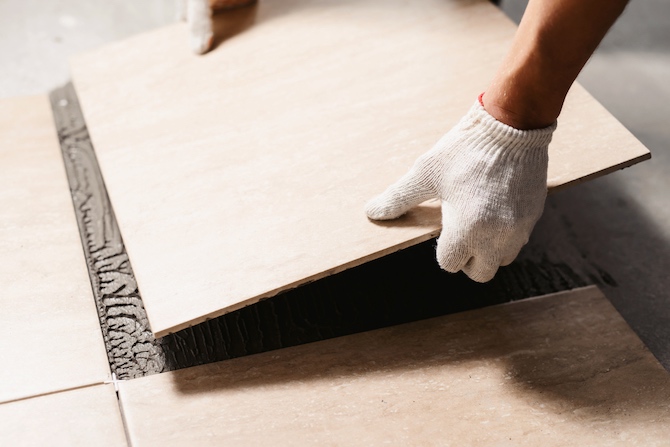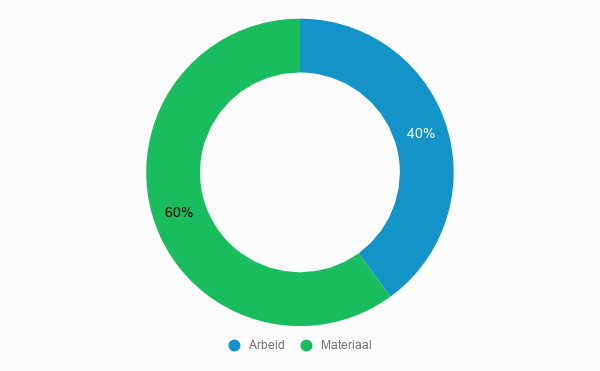Want to lay floor tiles in your home and looking for price information? Renoca gives you an overview of all prices and options, so you know what to expect when you have the ideal tiled floor laid for your home.
What does it cost to lay floor tiles?
If you have floor tiles laid by a tiler, the average cost per m² is between £35 and £200. The costs depend on the surface area, the type of tiles and the price charged by the specialist for laying tiles. Take a look at the average prices for laying floor tiles in the overview below.
| Factors | Average price per m² |
|---|---|
| Floor tiles | £ 15 – £ £ 40 |
| Glue and grout | £ 10 – £ 20 |
| Total | £ 50 – £ 220 |
Find the best specialist for your project and get free quotes.
Start

Price examples
The price table shows the average costs for different types of floor tiles and the tiler. What does this mean for your situation? Here are some price examples of floor tile installation:
Best choice
If you have your 20 m² kitchen floor tiled with cheap ceramic tiles, it will cost you a total of £1,000 to £2,800.
Average
If you are going to have your 40 m² living room floor tiled with relatively inexpensive natural stone, count on £2,600 to £4,400.
Large and luxurious
Are you going to have your entire ground floor, totalling 100 m², tiled with natural stone? On average, this will cost you between £6,500 and £22,000. The price here depends very much on the type of natural stone you choose.
Price structure for laying floor tiles

Choices that affect the price of floor tiles laying
In order to delve deeper into the factors on which the price depends, read more about the different choices below.
Choice 1: Types of tiles
First of all, you have a choice between ceramic tiles or natural stone. Ceramic tiles are made of clay, are made in a factory and are available in every conceivable colour due to a glaze. You even have ceramic tiles in special designs, such as wood-look tiles or tiles with the look of natural stone. The biggest advantage of ceramic tiles is that they are low-maintenance. Below is an overview of ceramic floor tile prices:
| Ceramic floor tiles | Average price per m² | Available in |
|---|---|---|
| Ceramic floor tiles | £ 20 – £ 60 | All colours |
| Terracotta tiles | £ 15 – £ £ 40 | brown tones |
| Cement tiles | £ 60 – £ 80 | various plain or colourful patterns |
In addition to ceramic floor tiles, you can also choose to have natural stone floor tiles laid. Natural stone is a unique product because it is formed by nature itself by heating or compressing rock. You can see the layers of earth reflected in the tiles and sometimes even fossils. As a floor tile, natural stone is very popular because it is timeless. Moreover, damage is not easily noticed as natural stone is coloured through and through. Prices and colours of natural stone are shown below:
| Natural stone floor tiles | Average price per sq m | Available in |
|---|---|---|
| Leist | £30 – £160 | Black, grey, green and red, mostly plain |
| Hardstone | £30 – £160 | sand colours, black/grey/white and blue, grey, red and green |
| Limestone | £40 – £135 | sand colours, black/grey/white and blue, grey, red and green |
| Quartzite | £ 40 – £ 150 | black, grey, green and red |
| Granite | £ 50 – £ 100 | black, grey, green and red, mostly speckled |
| Marble | £ 50 – £ 130 | sand colours, black/grey/white and blue, grey, red and green |
Please keep the following aspects in mind to enjoy your new floor for as long as possible:
- Impregnating: If you opt for natural stone on your floor, it is best to have the floor tiles impregnated so that they remain beautiful for a long time. This also applies to some ceramic floor tiles, if placed in the bathroom, for example. Impregnating agent costs £35 per litre. This will impregnate 20 to 35 m², depending on the absorbency of the floor tiles.
- PEI value: If you want your tiles to stay beautiful for as long as possible, it is important to look at the PEI value. A PEI value of 3 or higher is desirable for floor tiles, to prevent damage and ensure that you can live carefree on your new floor. The PEI value can be found on the tile packaging.
Choice 2: Underfloor heating
Always a pleasant temperature in your home and never cold feet again? Underfloor heating makes this possible. Underfloor heating has two functions: main or additional heating. If you opt for additional heating, the radiator remains as the main heating. If you make underfloor heating the main heating, you create more space in your home by making radiators unnecessary. Moreover, the house heats up more evenly and you don’t suffer from air circulation, as is the case with radiators. Underfloor heating can be installed in two ways:
- Milling the heating pipes into the screed.
- Mounting shrink nets, where the pipes are tied to steel nets or bubble plates. A finishing floor is then poured over this.
Below you can see a price overview for the two options:
| Number of m² | Injection | Crimp nets | |
|---|---|---|---|
| Main heating | 10 – 100 | £825 – £2.200 | £ 850 – £ 2,650 |
| Auxiliary heating | 15 – 150 | £ 825 – £ 2,200 | £ 850 – £ 2,650 |
Choice 3: Skilled tiler
Most tiler’s fees are £ 25 to £ 40 per m² or £ 30 to £ 40 per hour. In addition, some tilers charge a total price in advance for the entire project. Take a good look at what is included in the price, such as material and call-out charges, as these vary from one tiler to another. You can also get information in advance about the possibilities in your home through a consultation, which costs around £ 50. If, after the consultation, you decide to go ahead with the tiler, the consultation is free of charge for most of them.
Choice 4: Laying pattern
The tiler will charge an hourly rate for a special pattern, because laying the tiles takes more time. In addition, you will need extra floor tiles to lay special laying compounds, as tiles are cut to size. The most common laying patterns are:
- Full-stone bond: the tiles are placed right next to and under each other.
- Semi-tile bond: the first row starts with a whole tile and the second row with a half or third tile.
- Diagonal bond: similar to the full-stone bond, only now the tiles are laid diagonally instead of straight.
Examples of special laying patterns that take up more of a tiler’s time are Romanesque bond, wild banding and herringbone.
Choice 5: Tile skirting
Finally, you can choose to have skirting laid: these are narrow edges of the tile that are placed against the bottom of the wall. Tile skirting costs between £35 and £50 per m² for the material and installation by a tiler. Tile skirting ensures a perfect finish to your tiled floor.
Find the best specialist for your project and get free quotes.
Start
Frequently asked questions
To have a tiled floor laid costs between £50 and £220 per m² (including installation and VAT). The total cost depends on the type of tiles, the surface area and the tiler’s labour costs. Get a tiler quote to find out the exact cost of your project.
You can lay a tiled floor yourself with the right supplies and knowledge. Research well in advance what you need and how to go about it before you start. To make sure it’s done properly, we always recommend having it laid by a professional tiler. The professional has a lot of experience with this and makes sure the tiles are laid neatly.
You can lay a tiled floor yourself, but this requires a number of supplies. First of all, you need tile adhesive and grout to fix the tiles. In addition, you will often need a tile cutter or tile saw, mortar mixer or whisk for the drill, a spirit level, tile pliers, glue trowel, grouting tools, tile crosses and tile drills. Check carefully beforehand which tiles you are going to use, as you won’t need all the different tools for each type.